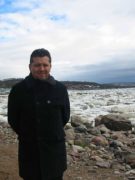The Jaguar / About Writing / Spell to Ward Off Fear of La Catrina
The Jaguar
I am leaving the earth
with a jaguar in my hand
a jaguar that carries
a heart in its hand
in the silent looms of Mitla
the Mexican night grows
like sharing bread
with a brother
I let the jaguar
eat my heart
jaguar with heart
in its hand
About Writing
this moment, if it is a coincidence
was already written
rebellion is not against a written destiny
but against the shackles of a single reading
dream or omen
the Word comes from Eve’s rib
the black bone carves hieroglyphics
on the skin of the moon
Oedipus doesn’t know his chimeric path
is the calligraphy left by smoke on retinas
the course of a crooked foot along the wrong streets
there are no coincidences
only confused pages
a library of pulverized adobes
monographs soaked in the vinegars of Canaan
the flames of Alexandria
the burning of Cuzco’s quipus
the imperial mandate of Qin Shi Huang
all for nothing
only we remain
armed with laughter
stripped of Nebrijas and Cartas de Jamaica
such is the road of the erudite ants
we who are barely
a handful of vowels and consonants
Spell to Ward Off Fear of La Catrina
like a lost child
touch her breast
let her
guide your hand
only then
will she give you everything
she will teach you
to write
on the rough hide of the night
on the ridges of the sea
on a child’s smooth forehead
in a language
of open wounds
let her guide your steady hand
explain to you
that to write
is to exercise
the vocabulary of silence
it is to redraw
the exact contour
the precise sorrow
of each scar
EL JAGUAR
me voy de la tierra
con el jaguar en la mano
el jaguar que lleva
un corazón en la mano
en el silencio de los telares de Mitla
crece la noche mexicana
como compartiendo el pan
con un hermano
dejo que el jaguar
se coma mi corazón
jaguar con corazón
en la mano
SOBRE LA ESCRITURA
este momento, si es coincidencia
estaba ya escrito
la rebelión no es contra el destino escrito
sino frente al eslabón de una sola lectura
sueño o augurio
el verbo sale de la costilla de Eva
su hueso negro talla jeroglíficos
en la piel de la luna
Edipo no sabe que su camino de quimera
es la caligrafía del humo en las retinas
el rumbo de un pie torcido por las calles equivocadas
no hay coincidencias
solo páginas que se confunden
una biblioteca de adobes pulverizados
las monografías remojadas en los vinagres de Canáan
el incendio de Alejandría
la hoguera de los quipus cuzqueños
el mandato imperial de Qin Shi Huang
no sirvieron de nada
quedamos nosotros
armados con la risa
desnudos de Nebrijas y Cartas de Jamaica
tal el camino de las hormigas ilustradas
nosotros que apenas somos
puñado de vocales y consonantes
CONJURO PARA NO TEMER A LA CATRINA
como un niño perdido
tócale el seno
deja que ella
guíe tu mano
sólo entonces
te lo dará todo
te enseñará
a escribir
sobre el áspero pellejo de la noche
en la rugosidad del mar
sobre la tersa frente de los niños
en un lenguaje
de heridas que no cierran
deja que ella guíe tu pulso
que te explique
que escribir
es ejercitar
el vocabulario del silencio
es dibujar de nuevo
el contorno exacto
el dolor preciso
de cada cicatriz
Translator’s Note
Alejandro Saravia’s work captured my attention from the very first time I read it. Soon after we met in 2007, he asked me to translate the poem that opens his first collection, Ejercicio de serpientes (Palabras prestadas, 1994). After several fledgling attempts to render “Hoy quizá llueva una ‘a’” into English, I agreed with him that it was impossible and set it aside. Recently, after many years spent dancing around it and translating several short stories, his first novel, and a good number of his poems, I revisited the poem and arrived at a version I felt confident enough to share with the author.
Saravia’s fascination with language is palpable throughout his prolific body of work. Writing and speaking are transformative acts—in that first poem, transmutation is enabled by a first, crucial step: writing the first vowel, the first letter of the alphabet, to realize the power and significance of language. The written word can soothe grief, alter mountains, bridge distances, spark creation itself. The three poems in this selection revolve around this axis, the all-encompassing generative process facilitated by the speaker’s engagement with language, silence, place, memory, and history. Maps are drawn. Pacts are made. Exchanges are negotiated.
As a poet and translator, I find in Saravia’s work an endless source of challenging encounters with the written word. But when is a poem finished? Poets know they must, at some point, consider a poem complete and let it go, even when they have more to say or strings of words could stand further refining to express a set of images and sensations. If writing poetry is an attempt to capture something essential, something felt but unknown and unsayable—if a poem is a snapshot, an approximation that can never fully convey that essence—if writing is a negotiated exchange mediated by language—what does translation add to the mix? One more pair of eyes to see, one more pair of feet to walk the same path, one more system of communicating vessels for the essence of the poem to flow through. The poem never stops.
This is a small sample from my humble, determined attempt to unearth, in the English language, the wondrous complexity of Saravia’s work. It is an honor to share my reading of these poems here. May these versions move, carry, and transmute you.
Special Guest Judge, Jesse Lee Kercheval
“One of the moments I enjoy most in reading translations is when they introduce me to a new writer and, through the joint act of the writing and translation, to a whole world. These three poems,”El jaguar,” “Sobre la escritura,” and “Conjura para no temer la Catrina,” lucidly and effectively translated here as “The Jaguar,” “About Writing” and “Spell to Ward Off Fear of La Catrina,” brought me that very real pleasure. The poems are by the Bolivian-Canadian Alejandro Saravia who lives and works as a journalist in Quebec. I see in these poems Bolivia, but also a world widened by immigration and exile, by a writer’s life of reading and thought. In “About Writing,” Saravia writes “such is the road of the erudite ants/ we who are barely/ a handful of vowels and consonants.” And the translations, in another voyage, another act of immigration, effortlessly bring Saravia’s words across to us in English.”
– Jesse Lee Kercheval is the author of 14 books including the bilingual Spanish/English poetry collection Extranjera/ Stranger (Yaugarú, 2015). Her translations include Invisible Bridge/ El puente invisible: Selected Poems of Circe Maia (University of Pittsburgh Press, 2015). She is also the editor of América invertida: An Anthology of Emerging Uruguayan Poets which is forthcoming from the University of New Mexico Press. She is the Zona Gale Professor of English and Director of the Program in Creative Writing at the University of Wisconsin-Madison.
 María José Giménez is a translator, editor, and rough-weather poet with a rock climbing problem. Recent work appears in K1N, Prelude, Rogue Agent, The Apostles Review, and Cactus Heart. Translations include poetry, short fiction, essays, screenplays, a mountaineering memoir by Edurne Pasaban, and Alejandro Saravia’s novel Red, Yellow and Green (Biblioasis, 2017), winner of a 2016 NEA Translation Fellowship. She is part of Montreal’s collective The Apostles Review and serves as Assistant Translation Editor for Drunken Boat.
María José Giménez is a translator, editor, and rough-weather poet with a rock climbing problem. Recent work appears in K1N, Prelude, Rogue Agent, The Apostles Review, and Cactus Heart. Translations include poetry, short fiction, essays, screenplays, a mountaineering memoir by Edurne Pasaban, and Alejandro Saravia’s novel Red, Yellow and Green (Biblioasis, 2017), winner of a 2016 NEA Translation Fellowship. She is part of Montreal’s collective The Apostles Review and serves as Assistant Translation Editor for Drunken Boat.
 Alejandro Saravia was born in Cochabamba, Bolivia and since 1986 has lived in Quebec, where he works as a journalist. His publications have appeared in publications across Canada and the United States, including Quiebre, Tinta y Sombra, Mapalé, Alter Vox, The Fourth River, and Cactus Heart. In addition to the novel Rojo, amarillo y verde (2003), he has published six books of poems and a short fiction volume about the 40th anniversary of the Chilean coup d’état, Cuarenta momentos chilenos (2013). He is part of Montreal’s Hispanic-Canadian collective The Apostles Review.
Alejandro Saravia was born in Cochabamba, Bolivia and since 1986 has lived in Quebec, where he works as a journalist. His publications have appeared in publications across Canada and the United States, including Quiebre, Tinta y Sombra, Mapalé, Alter Vox, The Fourth River, and Cactus Heart. In addition to the novel Rojo, amarillo y verde (2003), he has published six books of poems and a short fiction volume about the 40th anniversary of the Chilean coup d’état, Cuarenta momentos chilenos (2013). He is part of Montreal’s Hispanic-Canadian collective The Apostles Review.





